
The Suwon World Cup Stadium (수원월드컵경기장) is a football stadium located in Suwon, South Korea. It has been home of the K League 2 team Suwon Samsung Bluewings since 2001. The capacity of the stadium is 44,031.

Guri is a city in Gyeonggi Province, South Korea. It is located immediately to the east of Seoul, in the heart of the Capital Metropolitan Area.

Hanam is a city in Gyeonggi Province, South Korea. Formerly a part of Gwangju County, it was designated a city in 1989. The ancient Baekje capital of Hanam Wiryeseong may have been located there.

Seongnam is the fourth largest city in South Korea's Gyeonggi Province after Suwon and the 10th largest city in the country. Its population is approximately one million. It consists of three administrative districts: Bundang-gu, Jungwon-gu, and Sujeong-gu.
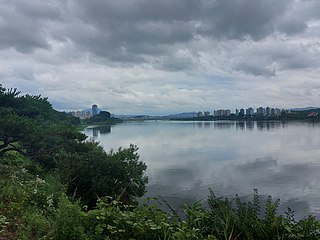
Yangpyeong County is a county in Gyeonggi Province, South Korea.

Hwaseong Fortress or Suwon Hwaseong is a Korean fortress surrounding the centre of Suwon, the provincial capital of Gyeonggi Province, South Korea. It was built from 1794 to 1796 by King Jeongjo of the Joseon dynasty to house and honour the remains of his father, Prince Sado. Sado had been executed by being locked alive inside a rice chest by his own father King Yeongjo after failing to obey a command to commit suicide. Located 30 kilometres (19 mi) south of Seoul and enclosing much of central Suwon, the fortress includes King Jeongjo's palace Haenggung. The fortress and enclosed palace were designated as a World Heritage site by UNESCO in 1997. It comprises among many other features the palace, a perimeter wall, four main gates, and two sluicegates over the Suwoncheon, Suwon's main stream, which flows through the centre of the fortress.
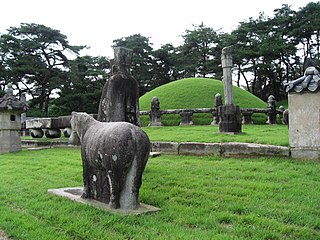
The Tombs of the Joseon dynasty refers to the 40 tombs of members of the House of Yi, which ruled Korea between 1392–1910. These tombs are scattered over 18 locations across the Korean Peninsula. They were built to honor and respect the ancestors and their achievements and assert their royal authority. The tombs have been registered as an UNESCO World Heritage Site since 2009. Two other Joseon tombs, located in Kaesong, North Korea, were proposed but not submitted.

The Bukhan is a tributary of the Han River that flows through both North and South Korea. It traverses Kangwon province in North Korea and Gangwon and Gyeonggi provinces in South Korea.

Seongnam Sports Complex is a group of sports facilities in Seongnam, South Korea.

The Jungnangcheon (Korean: 중랑천) is a tributary of Seoul's Han River. It is generated in the valley of Dorak Mountain of Yangju, Gyeonggi-do. Cheonggyecheon is a tributary of Jungnangcheon. Its whole river basin extends to 299.9 km2. Most of the stream is located in Uijeongbu and Seoul.
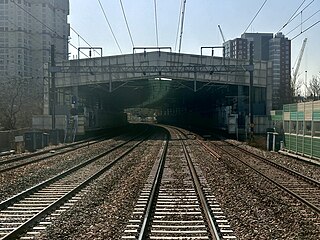
Sema Station is a station on Seoul Subway Line 1 in the city of Osan, South Korea. Services on the Gyeongbu Line also pass through this station.
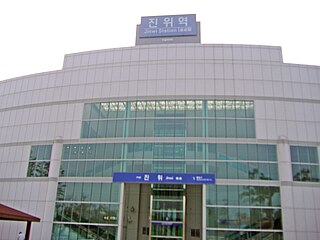
Jinwi Station is a station on Seoul Subway Line 1 in the city of Pyeongtaek, South Korea. Services on the Gyeongbu Line also pass through at this station.
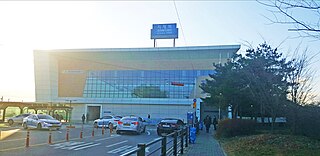
PyeongtaekJije Station is a subway station located in Pyeongtaek, South Korea. It serves the SRT and Seoul Subway Line 1. A large E-Mart store is very close to the station. On 24 November 2020, the name was changed to PyeongtaekJije.
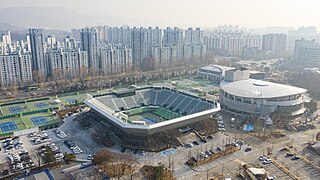
Seoul Olympic Park Tennis Center is a tennis venue in Seoul, South Korea, located in the Olympic Park. It hosted the tennis events for the 1988 Summer Olympics and has hosted several South Korea Davis Cup team and South Korea Fed Cup team ties. The center currently hosts the Hansol Korea Open Tennis Championships. The main stadium has a capacity of 10,000 people. The No.1 court has a capacity of 3,500, and the other 12 courts have a capacity of 900.

The Korea Museum of Modern Costume is a fashion museum in Seoul, South Korea.

Jamsil Indoor Swimming Pool is an aquatics venue located in Seoul, South Korea. It hosted the swimming, diving, water polo, synchronized swimming, and the swimming part of the modern pentathlon events at the 1988 Summer Olympics and the swimming at the 1988 Summer Paralympics. The venue was constructed from November 1977 to December 1980 and has a seating capacity of 8,000.
Sangsan is a mountain of South Korea. It has an elevation of 825 metres.
Seonbawisan is a mountain of South Korea. It has an elevation of 1,042 metres.
Hyeongjebong is a mountain of South Korea. It has an elevation of 1,778 metres.
Illimsan is a mountain of Jeollanam-do, southwestern South Korea. It has an elevation of 668 metres.

















